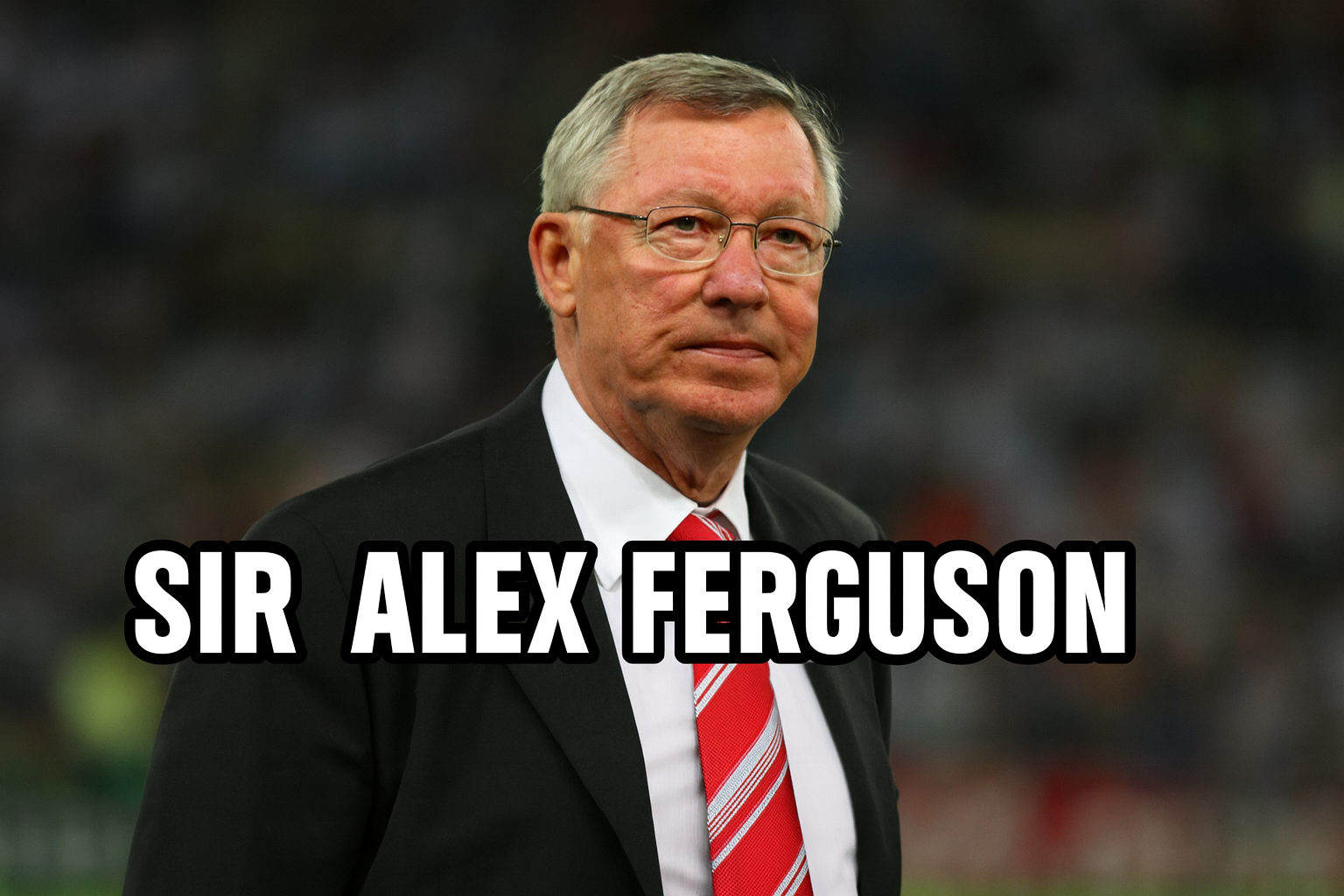Sir Alex Ferguson: The Legendary Scottish Football Manager Who Redefined Success
Triumphs, Trials, and the Enduring Legacy of a Global Icon

Introduction
Sir Alex Ferguson stands as one of the most celebrated figures in football history. Known worldwide as a Scottish former association football manager, his name is synonymous with discipline, vision, and relentless ambition. Born in Glasgow and raised in modest circumstances, he went on to become the most successful manager in Manchester United’s history and one of the most respected figures in global sport.
While Ferguson’s career is remembered for unmatched triumphs, it also had challenges and controversies that shaped his leadership style. His story is not only about lifting trophies but also about resilience, determination, and the ability to transform adversity into strength.
Quick Bio
| Field | Details |
|---|---|
| Full Name | Sir Alexander Chapman Ferguson |
| Date of Birth | 31 December 1941 |
| Age | 83 (as of 2025) |
| Birthplace | Govan, Glasgow, Scotland |
| Nationality | Scottish |
| Profession | Scottish former association football manager, ex-football player |
| Famous For | Legendary manager of Manchester United (1986–2013) |
| Children | Mark Ferguson, Darren Ferguson, Jason Ferguson |
| Major Honors | 13 Premier League titles, 2 UEFA Champions League, 1999 Treble, Knighted in 1999 |
| Net Worth | Approx. $70 million |
| Legacy | Widely regarded as one of the greatest football managers in history |
Early Life and Education
Born into a working-class family in Govan, Sir Alex Ferguson experienced the struggles of post-war Scotland. His father worked in the shipyards, while his mother cared for the household. The humble beginnings taught him discipline, perseverance, and a sense of responsibility that would later become central to his managerial philosophy.
Educated at Broomloan Road Primary School and later at Govan High School, Ferguson balanced academics with a growing passion for football. He also trained as a toolmaker apprentice, showing his early determination to support his family while pursuing the dream of becoming a professional footballer.
Playing Career
Ferguson’s playing career may not have reached the heights of his managerial success, but it played a crucial role in shaping his tactical mind. As a forward, he began at Queen’s Park, scoring goals with determination, before moving to St Johnstone, where he made a name as a hardworking striker.
His most successful spell as a player came at Dunfermline Athletic, where he became the Scottish league’s top scorer in the mid-1960s. Later, he joined Rangers, his boyhood club, in what was then a record transfer for Scottish football. Though his time at Rangers ended in disappointment, he continued playing at Falkirk and Ayr United until retiring in 1974.
Transition to Management
Ferguson’s managerial journey began at East Stirlingshire in 1974. Despite being a small club with limited resources, he impressed with his strict discipline and fierce competitive spirit. Soon after, he took charge of St Mirren, transforming the team and leading them to promotion.
His big breakthrough came at Aberdeen, where he broke the dominance of Celtic and Rangers. Under his leadership, Aberdeen won three Scottish league titles, four Scottish Cups, and most memorably, the UEFA Cup Winners’ Cup in 1983, defeating the mighty Real Madrid. This achievement cemented Ferguson’s reputation as a manager capable of competing with the best in Europe.
Manchester United Era
In 1986, Ferguson was appointed manager of Manchester United, a club struggling to reclaim past glories. The early years were difficult, and many doubted his ability to succeed in England. However, Ferguson’s persistence and belief in youth development turned the tide.
By 1990, he won the FA Cup, sparking a period of unprecedented dominance. Over 27 years at Old Trafford, Ferguson collected 38 major trophies, including 13 Premier League titles, 5 FA Cups, and 2 UEFA Champions League trophies. His crowning moment came in 1999 when Manchester United secured the historic treble—winning the Premier League, FA Cup, and Champions League in a single season.
Ferguson’s approach combined tactical innovation with psychological management. He developed world-class talents like Ryan Giggs, Paul Scholes, David Beckham, and Cristiano Ronaldo, while also revitalizing established stars. His famed “hairdryer treatment” showed his fiery discipline, but his loyalty and belief in players built long-lasting respect.
Leadership Style and Philosophy
Ferguson’s leadership was rooted in resilience and adaptability. He believed in rebuilding teams every few years to maintain competitiveness, ensuring United never stagnated. His focus on youth development through the club’s academy created a sustainable foundation that produced some of the finest British footballers.
Beyond tactics, his strength lay in man-management. He had an unmatched ability to motivate individuals, instill self-belief, and create a winning mentality. Yet, his reign was not free of criticism—his intensity sometimes led to disputes with players, referees, and even rival managers. Despite these conflicts, his methods consistently delivered success.
Business Ventures and Wealth
Away from football, Sir Alex Ferguson also engaged in business ventures. He co-founded ACF Sports Promotions Ltd, managing earnings from books, speeches, and memorabilia. His autobiographies became bestsellers, generating significant royalties.
His net worth is estimated at around $70 million, with income sources including managerial salaries, ambassadorial roles, speaking engagements, and endorsements. Even after retiring in 2013, Ferguson remained financially active, advising Manchester United as a board member and continuing to build his personal wealth through diverse ventures.
Personal Life
In 1966, Ferguson married Cathy Holding, with whom he shared a lifelong partnership until her passing in 2023. The couple had three sons: Mark, Darren, and Jason. Darren followed in his father’s footsteps, becoming a football manager, while Mark and Jason pursued careers in football management and business.
Ferguson is also known for his passion for horse racing and strong political views. His socialist values and working-class roots continued to influence his outlook on life and leadership, making him a figure respected beyond football.
Latest News and Legacy
In recent years, Ferguson has focused on philanthropy, charitable causes, and ambassadorial roles. In 2018, he survived a life-threatening brain hemorrhage, an event later detailed in the documentary Sir Alex Ferguson: Never Give In. His recovery was hailed as another display of his fighting spirit.
In 2025, he remains a symbol of football excellence. While Manchester United has seen ups and downs since his retirement, Ferguson’s influence is still felt at the club. His statue at Old Trafford and his induction into the Premier League Hall of Fame ensure that his contribution to football will never be forgotten.
Conclusion
Sir Alex Ferguson’s life is an extraordinary journey from the shipyards of Glasgow to the pinnacle of world football. His story reflects both positive achievements—trophies, records, and inspiration—and the occasional negative challenges that tested his resilience. He remains more than a football manager; he is a cultural icon, a leader whose lessons extend beyond the pitch.
His legacy is not only the trophies he lifted but also the values of discipline, determination, and loyalty that continue to inspire generations. Sir Alex Ferguson will always be remembered as the manager who redefined success in football and set standards that few will ever match.
FAQs
Q1: Who is Sir Alex Ferguson?
A Scottish former association football manager, best known for managing Manchester United from 1986 to 2013.
Q2: How many trophies did Sir Alex Ferguson win with Manchester United?
He won 38 major trophies, including 13 Premier League titles and 2 Champions League titles.
Q3: What is Sir Alex Ferguson’s net worth?
His estimated net worth is around $70 million, sourced from football, books, speeches, and investments.
Q4: What was Ferguson’s biggest achievement?
Winning the historic treble in 1999: the Premier League, FA Cup, and UEFA Champions League in one season.
Q5: What is his legacy?
Ferguson is remembered as one of the greatest managers in football history, shaping Manchester United and inspiring countless players and fans worldwide.



